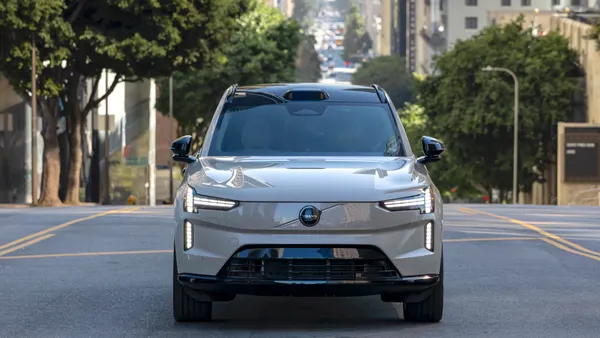Editor's note: This story is part of the WardsAuto digital archive, which may include content that was first published in print, or in different web layouts.
PARIS – Deciding the time is right, Ford will launch its electrified-vehicle lineup in Europe at the Frankfurt auto show Sept. 10. The cars already are on sale in the U.S, where Ford says it has a 15.7% market share behind Toyota.
The Focus Electric is in production at Ford’s Saarlouis plant in Germany, while the C-Max Energi plug-in hybrid arrives, and the Mondeo enters into production, in 2014.
The C-Max Energi will be imported from the U.S., but the hybrid will be built at Ford’s Valencia, Spain, plant next year once it moves operations from the factory it’s closing in Belgium.
The Focus EV, priced at €39,000 ($51,000) in Germany, is not expected to sell in large numbers. In France, only five or six dealers in large cities will handle the cars, which limits the investment in training and equipment, says spokesman Fabrice Devanlay.
However, Roland Krueger, chief of electric powertrain development at Ford’s European technical center in Cologne, says, “It is about the right time for hybrids in Europe.”
Until now, Europe has not been a big market for EVs and hybrids because diesels provide similar fuel savings at a lower cost, he says. But future emissions regulations will require more-expensive aftertreatment on diesels and turbocharged gasoline engines are getting better, so gasoline hybrids will become more competitive here.
Ford says the plug-in C-Max will be rated at less than 50 g/km of carbon-dioxide emissions, and the Mondeo hybrid (Fusion hybrid) will be rated at less than 107 g/km. Already, Ford’s smaller cars in Europe, the Fiesta and Focus powered by a 1.0L, 3-cyl. Ecoboost engine emit less than 100 g/km.
For now, Ford uses an Atkinson-cycle 2.0L gasoline engine with its hybrids, but in the future it could begin using smaller turbocharged engines, Krueger says.
Ford is approaching alternative powertrains cautiously, choosing to make electrified versions of global vehicles so they can share the same assembly lines, thus avoiding radical disruptions in overall volume when customer powertrain demands change.
“Demand for electric vehicles is highly unpredictable,” says Andreas Schamel, Ford director-global powertrain research and advanced engineering. Not only is customer demand unknown, it also is subject to changes in legislation.
To help identify future market demands, Ford has been leading a government-supported program in its European headquarters city of Cologne, in partnership with the local electric company, university researchers and city and national governments.
The Cologne e-Mobil experiment, directed by Krueger, started in 2009 with the electric Transit, Transit Connect and Focus vehicles in the hands of users who provided technical feedback.
In a second phase, that will continue through 2015. Ford is adding 34 C-Max Energi and 15 Focus EVs. The project also has taken on new partners, including the local bus company, a solar-panel manufacturer and a car-sharing firm. Germany is providing €7.6 million ($10 million) in financing for the €13 million ($17 million) project.
Krueger says a principal goal is to identify “which technology is best suited for different mobility applications.”
The Focus EV has a greater electric range than the C-Max plug-in hybrid, but the plug-in avoids range anxiety. Both vehicles will be used in different experiments, and every trip will be entered into a database.
Analysis may help identify potential demand. For example, car-sharing in cities could be the best use for Ford’s battery-electric vehicles, Krueger says.
Other goals are to analyze customer behavior and acceptance, develop a way for users to get electricity during recharging from electric companies that are not their usual provider and determine how much help can come from solar energy in carports covered with solar panels.








